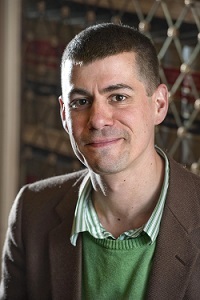Sean Adams on the ‘Being Jewish, Writing Greek’ conference
This is a guest post by my good friend Dr Sean Adams, Lecturer in New Testament and Ancient Culture at the University of Glasgow (picture above), on the conference ‘Being Jewish, Writing Greek’ hosted recently by the University of Cambridge. I’m very grateful to Sean for his willingness to share this summary of what was clearly an excellent and highly stimulating conference.
Sean Adams writes…
It was my privilege to attend and present at the ‘Being Jewish, Writing Greek’ conference that was held at Cambridge University on 6-8 September 2017. This three-day event included papers from fourteen scholars (both early career and senior) on a range of Jewish works and was the culmination of a year-long seminar series held at the University. (For a list of the speakers and papers given, see below.)
The stated goal of the conference was ‘to bring together scholars from the fields of Classics, Biblical Studies, Jewish Studies and beyond to explore the literary aspects of Jewish texts in Greek’.
This intentional interdisciplinary focus was a real highlight of the meeting and provided rich dialogue and a variety of perspectives that go beyond those normally found in conferences on Jewish literature. For example, attendees were regularly challenged by presenters to reconsider longstanding assumptions and to problematise simplistic models of cultural interaction. A good model for this nuance was the paper given by Jim Aitken who demonstrated how the translator of Ben Sira was able to allude and engage with elements of Homer’s Odyssey even in a ‘literal’ translation (a similar point was also developed by Nicholas de Lange, but with regard to Symmachus’ translation of Hebrew Scriptures). Similarly, Sylvie Honigman emphasised the need to take the author’s ancient location into account when discussing issues of composition, highlighting situatedness as a constraint for interpretation.
A prominent topic with which a majority of the papers engaged was the issue of genre. Some papers, such as my own, focused primarily on the messiness of genre in the Hellenistic era and challenged certain genre claims that had been previously offered. Other presenters, such as Marieke Dhont, Jill Hicks-Keeton, and Eva Mroczek, evaluated select literary elements, placing them within their larger genre and compositional contexts and highlighting the authors’ intentional inversion of literary tropes.
The above examples showcase the diversity of approaches, but a dominant idea held almost universally by those in attendance was the deep interconnected nature of the texts and that the traditional divisions (be they linguistic, ethnic, geographic, temporal, or modern university departments) were deeply problematic and did not facilitate an integrated understanding of Jewish literature. Although this position was assumption throughout, two scholars, Marieke Dhont and Hindy Najman, made this critique a focus of their papers, calling those in attendance to think critically about the state of the field and how it is segmented. Being welcomed in the Classics department at Glasgow University (as well as developing a very interdisciplinary MLitt in Ancient Cultures with Classics, Theology, Egyptology, Archaeology, and Celtic Studies), I very much agree with this critique of the fragmented nature of scholarship and see great potential for scholars (and conferences!) that intentionally seek deeper integration.
Overall, this conference was a wonderful event and the organisers (Max Leventhal, Lindsey Askin, Emma Greensmith, Srećko Koralija, and Max Kramer) should be commended for what was surely a Herculean effort. The presenters and those in attendance were thoughtful and respectful in their discussions and there was a strong balance of genders and scholars of different stages of their careers. This is an excellent example of the type of conference that is both a joy to attend and an advance of scholarship. I very much look forward to their next event!
For more information on the conference, visit the official website.
- Speakers and paper titles
- Sylvie Honigman: ‘How to Rewrite a Source: the Letter of Aristeas and 2 Maccabees’
- Jim Aitken: ‘Cross-Cultural Translation and Classical Allusion in the Greek Version of Sirach’
- Marieke Dhont: ‘No Author is an Island: A Systemic Approach to the Development of Jewish-Greek Literature’
- Stuart Thomson: ‘Who’s Philo? Whose Philo? Alexandrian Texts and Identities’
- Anna Furlan: ‘The ‘One God’ of the Pseudo-Orphic Hieros Logos
- Jill Hicks-Keeton: ‘Categorizing Joseph and Aseneth: The Evidence of Artapanus, Demetrius, and Philo’
- Simon Goldhill: ‘Strange Dogs: Cultural and Literary Transformation in Joseph and Aseneth’
- Alexander Noak: ‘Jewish Identity in the Fourth Book of the Sibylline Oracles’
- Eran Almagor: ‘Josephus the Greek Imperial Author’
- Sean A. Adams: ‘Sympotic Questions: The Genre and Structure of the Letter of Aristeas’
- Hindy Najman: ‘Linguistic Border-crossing Revisited: Thinking Greek, Writing Hebrew’
- Eva Mroczek: ‘Writing without Memory: The Hymns of Job’s Daughters and Other Imaginary Books’
- Nicholas de Lange: ‘The Poetics of Aquila and Symmachus’
- Tessa Rajak: ‘Closing Remarks’

